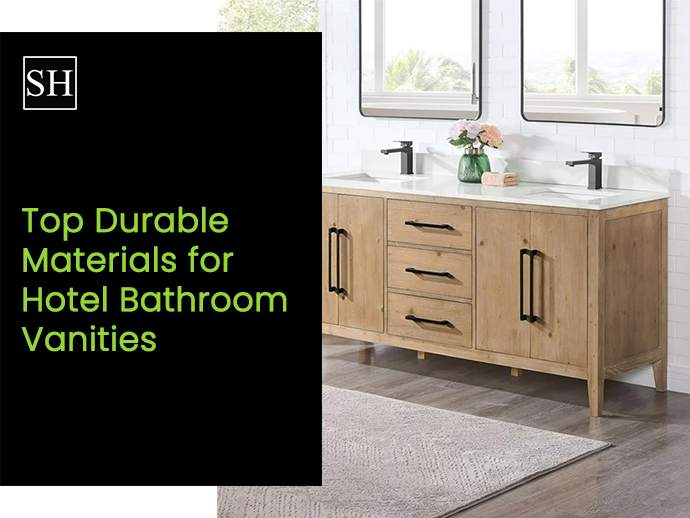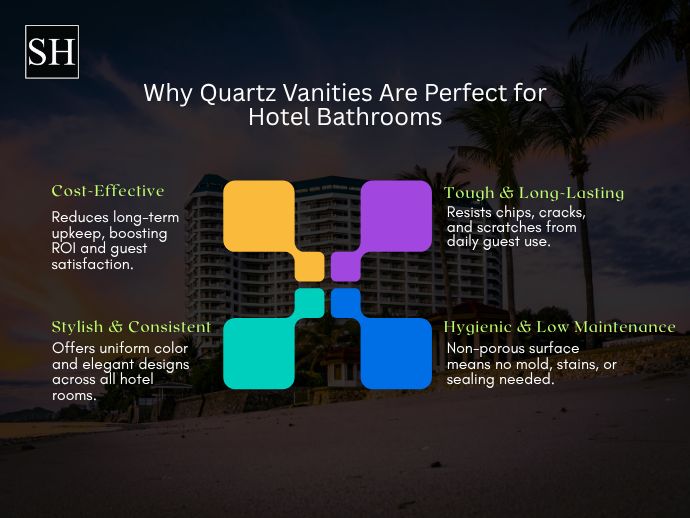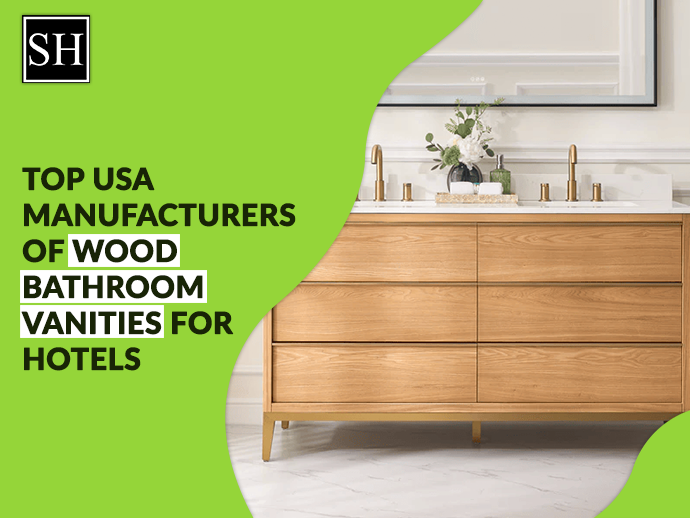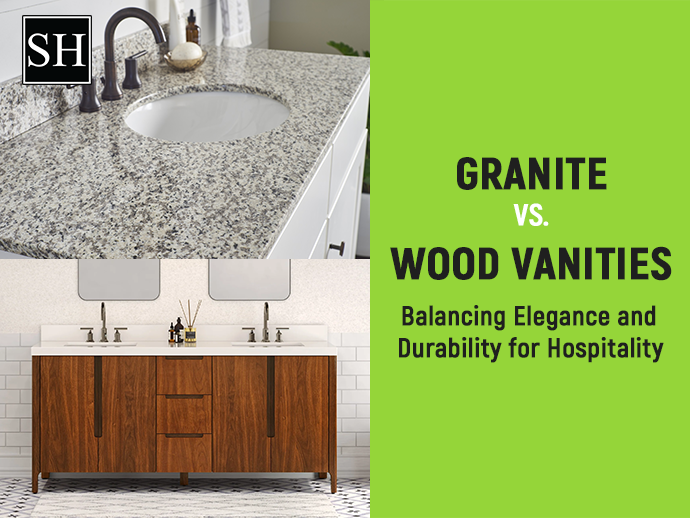
Top Durable Materials for Hotel Bathroom Vanities 2026
The well-furnished hotel bathroom vanity is sure to grab the guest’s attention as they stroll into the bathroom. A claim can be made about the hotel rooms that contain a vanity or a sink, that it is a shell which serves as a beautiful cover together with an efficient workhorse. An older, dull, or cracked vanity will remain a sore eye in a visibly stunning room. Whereas, it can be blended together alongside a spotlessly chosen vanity which can definitely increase value as it signifies honor towards one’s commitment. Now the question arises that what blend of materials will suit a vanity in a harsh environment and still endure constant wear and tear that a focusing hotelier of a harsh environment would endure.
Begin with an extensive evaluation with the most popular choices first: quartz, wood, and granite. It is essential to supply you with information that puts forth the sanity driven options and aid you achieve your aesthetic goals while also ensuring smooth operations, unsurpassed guest and employee experience, and profitability. The need of the hour is to strike that middle-most point where focus on merely stunning appearance and robust unwavering face along with minimal upkeep or any strain turns to maintenance.
Quartz vs. Wood vs. Granite Bathroom Vanities: A Quick Overview for Hoteliers
Before examining each material in detail, let us build some basic knowledge of these three popular options. Each offers a unique contribution to your hotel bathroom, and understanding these fundamental attributes is, in fact, a pivotal stages of the decision-making journey. You may think of this as a guide on Quartz vs. Wood vs. Granite vanity material, geared towards assisting you with initial thoughts.
Quartz Bathroom Vanities:
- An artificial stone known as quartz is made up of ground quartz that is mixed with polymer resins and pigments. It has 90 to 95% composition.
- In the hospitality industry, attention is given to material that possesses greater endurance, which happens to be quartz. Its attributes also include being nearly non-porous, having insignificant staining, high hygiene standards, and lower maintenance work. The industry also takes note of the grams modern ingenuity offers in hospitality.
Wood Bathroom Vanities:
Wood charm offers unparalleled elegance alongside rustic, traditional character. Solid oak and maple are examples of tree radiates versatile aesthetics. The primary challenge is gettin over the innate it is persistently vulnerable to moisture. Due to the nature of bathrooms, this will demand great care selection and maintenance.
Granite Bathroom Vanities:
- Granite is 100% naturally occuring igneous rock, extracted from earth directly.
- Every slab showcases unique luxurious veins and colorations, and as such, it requires regular sealing to prevent stains due to its porous nature as a natural stone. Despite this, it retains heat exceptionally and withstands significant amounts of stress.
- Hotel bathrooms come with a particular, sophisticated and fancy style, and this means that the vanity will face extreme wearing challenges when compared to someone’s simple home. These include the mad dash for cleanliness from every finer detail of a single use, constant 24/7 access, splash zone of harsh toiletries, shower gels, and powders (difficult to scrub), plus turbo scrubbing necessities. In such high requirements conditions, why the importance of comparing each material in thorough detail can be fully comprehended.
Why Quartz Vanities Are a Top Pick for Hotel Bathrooms

The increase in the use of quartz for hotel bathroom vanities is not a trend that will fade quickly; it stems from a unique mix of being visually appealing as well as highly practically beneficial. When it comes to managing budgets, operational staff productivity, and guest services, quartz almost always comes out on top.
In the ongoing discussion of quartz vs granite vanities and quartz vs wood vanities, quartz is often favored for its durability, low maintenance, and consistent appearance, making it a smart choice for hotel settings where longevity and ease of upkeep are crucial.
The Science of Superiority:
Quartz is made for constant use. Its manufacturing process is rather intricate, involving the combination of natural quartz crystals with resin, heated and pressed to form an extraordinarily dense, effectively non-porous surface. This fact alone changes the game in a bathroom setting.
- Durable: Makeup, toothpaste, lotions, hair dye, and even vigorous cleaners do not present much of a risk to quartz surfaces. Because they will not deep clean or stain quartz surfaces, it makes it easier for your vanities to retain their outstanding shape.
- Hygiene: No non-porous material will allow for the hiding of bacteria, mold, or mildew growth which makes it a vital tool where cleanliness is crucial. This disinfecting feature removes most of the work involved in cleaning the surfaces and enables guests to be relaxed.
- Being Non-Porous: quartz does not need sealing which translates to no upkeep needed. This makes quartz a useful material since the time and financial expenses are decreased in the long run.
Durability Designed for Hospitality:
In hotel rooms, quartz surfaces such as vanities endure extreme impact. Unlike other materials, quartz is made to withstand such force.
- Scratch and chip resistance: The surface is extraordinarily resistant to scratches, chips, and cracks from everyday use. These scratches include placing luggage on the surface, dropping toiletries, or a myriad of other ways guests may occupy the room.
- Long term appearance: For hotels, this is an extremely strong defense quartz vanities provide. They do not need to be verified for repairs or replaced due to wear and tear and maintain their ‘new’ look for longer periods. This makes quartz a better option against granite for hotel rooms.
Aesthetic Consistency and Versatility:
- If you are outfitting several rooms, quartz guarantees unmatched uniformity in color, pattern, and finish across different slabs. This maintains a consistent high-quality look throughout your property.
- From stunning whites and soft neutrals to vivid colors and complex designs, quartz can effectively imitate marbles or granite. The ease in crafting quartz ensures it can fit almost any hotel style, unlike natural stones which possess innate weaknesses.
For hoteliers looking for something modern yet effortless, quartz beautifully merges sophistication, ruggedness, and elegance all in one.
Wood Vanities in Hotels: Natural Beauty, But Is It Practical?
The use of wood in interior design captures one's attention without hesitation. The material assists in making a bathroom feel more welcoming and less sterile due to its warm nature and organic beauty. Regardless if a hotel is designed as a contemporary boutique, a classic, or a rustic lodge, wood vanities can be tailored to match the desired aesthetic. The discussion around the modern vs rustic hotel vanity styles is the perfect begining to showcase wood’s versatility.
The Moisture Challenge:
Wood, for instance, set for a hotel bathroom, requires a practical approach. Water, the most potent threat to wooden surfaces, rests in bathrooms.
- Threat: Steady assault by steaming hot water from showers, scrubbers attached to sinks, and aggressive moisture results in long term impacts such as fractures and swelling, potentially even mold, unless guardrails are put in place and maintained.
- The Most Important Detail: A wooden vanity is primarily susceptible to water damage and thus needs adequate finishing to the texture. In a hotel, constant abuse from guests and cleaning staff pose a daily threat to the finish.
Making Wood Work in Hospitality:
The major debate about quartz versus wood hotel bathroom vanities has to focus on moisture sensitivity. Careful design and maintenance is required for wood, while quartz provides waterproof hermetic properties.
- Wood Selection: The right type of wood is the crux of the matter. Some varieties, such as teak or some cedars, possess high oil content which helps them resist moisture and decay. There seems to be a consensus on the oak vs teak wood for hotel vanities debate toward using teak quite heavily for high-moisture applications; however, cost is a concern.
- Construction & Sealing: Knowing the specifics of solid wood vanities as opposed to engineered wood vanities remains important. In some cases, marine-grade engineered plywood with a waterproof veneer and fully sealed edges can outperform solid wood in humid conditions due to better dimensional stability and moisture resistance. Although, solid wood is more vulnerable to shrinking and swelling. Increased exposure to high quality polyurethane or conversion varnish sealant, especially on cutouts for sinks and faucets, is a requirement.
- Design Considerations: Mitigating direct contact with water, such as wall mounted or stone/quartz topped vanities, prolongs the life span of wood elements in a restroom.
Despite giving a hotel bathroom a sophisticated feel by using wood, which offers unmatched natural beauty and warmth, poses a challenge in terms of maintenance and selection of wood type. Special consideration has to be given to what wood is used. Wood does have its perks, but comes at a price.
Granite Vanities: Timeless Luxury with Lasting Performance
For both commercial and residential interior design, granite has arguably been regarded as the epitome of luxury and timeless appeal due to its durability. As a solid piece of granite forms in nature, it has captivating coloration, unique veins, and a distinctive individual character which makes it a 100% natural igneous stone. Because no two slabs of granite are the exact same, this ensures that with every granite vanity installed, hotels are able to transform their bathrooms aesthetic to create a one of a kind bespoke elegance while keeping the individuality of nature showcased in stone.
Inherent Strengths of Granite:
- Heat Resistance: Among its many notable practical traits, granite is most recognized for its high resistance to heat. It can be quite advantageous in a busy guest bathroom as guests may easily place curling or straightening irons on the granite surface without much worry regarding scorching or damage.
- Durability and Hardness: Being a natural stone, granite is hard and dense which gives it a comparative advantage in scratching, abrasion, and general wear and tear resistance. Its strength is especially pertinent when comparing granite and wood vanities as the primary deciding factor is often long-term durability.
The Consideration of Porosity:
But porosity is really one important property of granite, especially when comparing granite vs wood vanities. On the microscopic level, the pores in natural stone, when unsealed, can absorb liquids.
- Stain Vulnerability: Liquids in a bathroom setting can be water, soap, various cosmetics, toiletry oils, or even some cleaning agents. The absorption leads to staining and discoloration if left unchecked, which can even run bacteria-friendly courses.
- The Need for Sealing: Sealing granite periodically and thoroughly with an appropriate impregnating sealant is how one counteract the pores and maintain that look and hygienic quality for the granite vanity. Most of these measures, for a hotel in fast-paced action, include professional sealing on a once-a-year basis, half-yearly in some cases, depending on the kind of granite, intensity of use, and quality of sealing performed previously. This lasting maintenance requirement, both in time and expense, is a weighty matter for any hotelier to put some thought into, especially when granite is compared to naturally non-porous materials like quartz.
Granite surely has the good looks and name quality and strength and physical durability, but with its porosity, an aggressive maintenance approach must be taken on a regular basis to protect the investment value, maintain the great looks, and continue to provide a sanitary surface all along inside demanding bathroom interiors at your hotel.
Material Showdown: Quartz vs. Wood vs. Granite at a Glance
To simplify your decision-making, here’s a direct comparison across key factors relevant to hotel operations:
|
Feature |
Quartz |
Wood |
Granite |
|
Durability |
Scratch, chip, stain resistant |
Prone to water damage, scratches, dents |
Heat/scratch resistant, can chip |
|
Maintenance |
Non-porous, no sealing ever |
Requires diligent sealing, careful cleaning, moisture monitoring |
Requires regular sealing, careful cleaning |
|
Water Resistance |
Virtually waterproof |
Highly dependent on perfect sealing |
With proper, consistent sealing |
|
Hygiene |
Non-porous, resists bacteria/mold |
Can harbor mold/bacteria if seal fails or wood is porous |
Good if consistently sealed; otherwise, can harbor bacteria |
|
Aesthetics |
Consistent, modern, wide color/pattern range, mimics stone |
Warm, natural, unique grains, highly versatile styles |
Unique, natural, luxurious, classic appeal, varied patterns |
|
Initial Cost |
Mid to High |
Low to Very High (depends on wood type, solid vs. veneer, custom) |
Mid to Very High (depends on rarity and origin) |
|
Long-Term Cost |
Low (due to low maintenance & high durability) |
Potentially High (due to maintenance, repairs, earlier replacement) |
Moderate (factoring in sealing costs and specialized care) |
|
Heat Resistance |
Very Good (Caution with extreme, prolonged direct heat) |
Poor to Fair (Can scorch or warp) |
Excellent |
|
Sustainability |
Some brands use recycled content & sustainable practices. Durable. |
Good if responsibly sourced (FSC, reclaimed). Renewable. |
Natural resource; quarrying impact. Very durable. |
Comparing Maintenance: Which Vanity Material Saves You Time and Money?
In the hotel environment, operational efficiency is the attribute essential for it. Time saved is money earned, and maintenance routines amount to a big chunk of ongoing operational costs. The easier it is to clean, maintain, and keep your bathroom vanities looking fresh, the more straightforward housekeeping operations will be, and the lesser the long-term cost for specialized care, repair, and final replacement.
Quartz:
- Daily Care: For maintenance, quartz really makes a strong case. The surface is nonporous, which means it never really needs sealing-a great saving in the long run. Routine cleaning is exceptionally easy-just a wipe down with mild soap and water or a pH-neutral, nonabrasive cleaner.
- Stain & Hygiene Benefits: It is naturally resistant to stains caused by common bathroom chemicals and restricts the growth of bacteria, mold, and mildew. This could ease the cleaning schedule, cut down on the use of harsh chemical cleaners, and greatly improve guest room hygiene.
- Long-Term Savings: Minimal daily maintenance coupled with no sealing or special treatments means vanities can greatly save the owners in labor hours and cleaning product expenses throughout their lifespan. Its durability means better savings in repair or touch-up costs.
Wood:
- Daily Care & Precautions: Wood vanities unequivocally demand the utmost attention and consistent care. There are frequent observations regarding the state of the sealant that must be done to make sure that the wood is protected enough from moisture ingress. Cleaning should be done with care, using soft cloths with wood-friendly, non-abrasive cleaners. Using harsh chemicals, excess water, or abrasive scrubbing pads will ruin the finish and lay bare the wood.
- Moisture Management: Any spills should be cleaned right away, and thoroughly to ensure there are no water stains, staining, or moisture even coming close. Standing water for long periods offers extra damage.
- Periodical Upkeep: Based on the quality of sealing initially done and the degree of use, the wood vanities may need to be periodically re-sealed or refinished to keep the protective coating and visual appearance. Should the seal be otherwise, moisture will cause the wood to warp, discolor, grow mildew, or structurally damage the item even more-distressing and expensive repairs or even premature replacement. Extra vigilance, specialist care products, and laborious cleaning make wood the high-maintenance option.
Curious how wood options stack up? Explore our deep dive into hotel vanity materials in our blog: Solid vs Engineered Wood Hotel Vanity Material
Granite:
- Daily Care: The daily cleaning of any well-closed granite vanity is fairly simple enough, mostly with the use of a pH-neutral cleaner made for natural stones, or one could just opt for mild soap and water. One must never opt for acid cleaners or abrasive cleaners because these may slowly etch the surface or might even wear down the sealer.
- Sealing Imperative: The key factor for good granite maintenance is an efficient sealing process that needs to be done periodically. This will not be done once at installation; sealing has to be done at certain intervals, mostly on an annual basis when applied in the commercial hotel ambiance, although some very high-use areas and in some few granite types might require sealing every six months. The function of sealing is to make sure that the stone is not absorbing any sort of liquid in stains or bacteria.
- Sealing Costs: Granite sealing maintenance ultimately adds to the long-term maintenance budget of a granite countertop. These costs will include professional sealing costs, plus any additional labor if the hotel staff elects to do it internally, or the expenses of cleaning and restoring granite should sealing not be done. Without sealing, granite can stain visibly, dull its finish, and become very hard to clean effectively and may require professional restoration.
Though all vanity materials require constant cleaning on a daily basis to maintain hotel standards, quartz semipermanently offers its users the lowest overall maintenance. This is because it is relatively non-porous and needs no sealing, which will potentially save a great amount of time and money across the full life span of the bathroom vanity.
Tips For Choosing the Best Hotel Bathroom Vanity Material
So picking your last choice for your hotel is a tricky balancing act, considering a number of crucial factors that are particular to your property’s individual circumstances, brand equity, operational capabilities and economic structure.
- Deeply Consider Your Guest Profile & Hotel Style: Consider your guests, the demographic of your average visitor and the general aesthetic of your property should strongly steer your material decision. A luxury, five-star hotel focused on a wealthy clientele would perhaps play up the uncommon, natural beauty of premium granite or the rich warmth of custom wood interiors to achieve a sense of the rich and famous. A new, busy corporate business hotel may care more about the sleek durability, uniform appearance and ultra-low maintenance of quartz. Your vanity selection will need to effortlessly balance your complete interior design aesthetic while reliably delivering and often surpassing guest expectations for your hotel’s desired star rating, price point and brand positioning.
- Holistically Factor in Durability vs. Overall Cost (Initial & Long-Term): While some materials might present a lower upfront purchase and installation cost, it is crucial to consider the total cost of ownership over the intended lifespan of the vanities. Replacing less durable materials, such as with quartz—which may have a higher initial price tag—could save a lot of money in the long run with far fewer repairs, less chance of needing to be replaced early and lower ongoing maintenance costs (requiring things like sealing or specialty cleaning products). Instead of just low-bid the initial contract, require life-cycle cost analysis.
- Realistically Evaluate Your Maintenance Commitment and Capacity: Be honest and pragmatic about your housekeeping team's available time, training, and your allocated budget for ongoing maintenance. If the greatest operational priority is reducing daily cleaning time or periodic maintenance tasks (sealing, etc.), then a non-porous, no-seal material like quartz is a great advantage and extremely resourceful in an operational sense. If you’ve got the dedicated budget and established protocols for sealing carefully with granite or maintaining wood and moisture levels, then sure those options are still very much possible and can yield beautiful results.
- Unwaveringly Prioritize Hygiene and Ease of Sanitation: With the increased focus on hygiene from today’s guests, establishing true evidence of cleanliness, especially in the bathroom of your guest room, is naturally more crucial now than ever. Most non-porous surfaces like quartz offer an intrinsic, easy-to-recognize advantage of resisting bacterial and microbial growth, combating mold and mildew and being incredibly simple to sanitize day in and day out with common disinfectants. If you are considering using porous materials such as porous granite or certain natural woods, you should be ready to demonstrate rigorous, documented regular cleaning and regular re-sealing (or finishing with a protective seal) processes to maintain these porous materials in a fully sanitary condition at all times.
- Never Overlook Sustainability and Environmental Considerations: Check the environmental credentials of your materials. Select quartz manufacturers who can state that they use recycled content in their products or follow sustainable or energy-efficient production means and hold third-party certifications (say, GREENGUARD, NSF). In the case of wood vanities, ensure an independent certification for the timber supplier, such as FSC (Forest Stewardship Council) certified, with the supplier also employing reclaimed wood as far as possible. This will ensure that the forestry and resource management have been responsibly conducted. Longevity and durability inherent in the material selections also have a bearing on sustainability: A vanity that lasts for longer actually contributes to less waste along with less environmental damage caused through the manufacture of another vanity and replacing it.
- Actively Engage Experienced Professionals: Consult established hospitality furniture suppliers, seasoned hotel-focused interior designers, or trusted contractors with an assurance of delivery in the hospitality sphere. They will bring seasoned practical knowledge to assist when using particular kinds of materials in actual hotel situations. They will guide you through the maze of possibilities, give you pointers on local building codes and accessibility requirements, and essentially steer you in the direction of the very best fit for your material on your particular project's individual needs and aspirations. At Sara Hospitality USA, we have been regularly partnering with hoteliers, giving exactly this sort of expert advice through the
Conclusion
Selecting the right material for your hotel bath vanities is strategically important, with implications far beyond mere visual aspects. Fundamental to this matter is setting up a bathroom space that is aesthetically pleasing and genuinely reflective of your unique hotel brand; thus, it must be immensely durable for cleaning, easy and efficient for the staff to maintain, and one whose hygiene and safety could be duly assured for the guests.
While the natural beauty inherent in wood and the timeless, inheriting luxury of granite have their persuasive appeals and can be adorning choices in specific settings, quartz, more often than not, remains an extraordinarily practical, fashionable, and operationally sound proposition-perfectly suited to the unrelenting rigor and taxing demands of a modern hotel.
In the end, the best material is that which most efficiently employs and harmoniously corresponds with the operational needs of a hotel, its well-thought design direction, its budget allocation, and its great concern for guest satisfaction.
When one carefully and impartially weighs the pros and cons that distinctly belong to quartz wood and granite and combines this with a comprehensive overview of long-term resilience, daily maintenance, absolute hygiene standards, and overall influence on the guest experience, he or she could certainly call this an investment made with intellect.
- SOFT SEATING
- BATHROOM VANITY
- FIXTURE EQUIPMENT
- Hospitality Casegoods
- Hospitality outdoor furniture
- Senior living furniture
- Hotel reception desk
- High end contract furniture
- Premium Hotel Bedroom Furniture
- Custom commercial furniture
- Hospitality Furniture Manufacturers in Canada
- Leading Hotel Furniture Manufacturers in Canada
- Casegood manufacture canada
- Hotel Casegoods
CATEGORIES
FREQUENTLY ASKED QUESTIONS
RELATED BLOGS

The Ultimate Guide to Bathroom Vanities 2026
Sara Hospitality | Feb 05, 2026

Top USA Manufacturers of Wood Bathroom Vanities for Hotels
John Smith | Jan 22, 2026

Granite vs. Wood Vanities: Balancing Elegance and Durability for Hospitality
Sara Hospitality | Jan 12, 2026
















